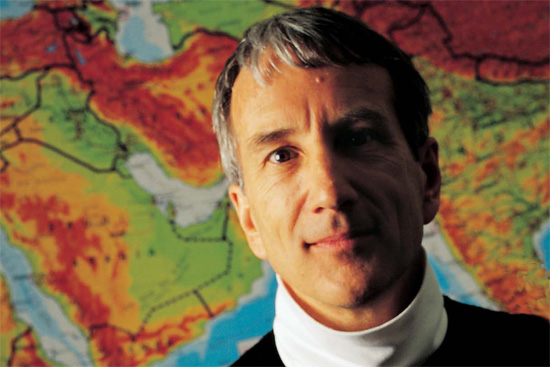Economics Professor Testifies Before U.S. Senate
 |
|
Gary Yohe, the John E. Andrus Professor of Economics, suggests that the government place a growing tax on the cost of carbon during a hearing March 30 in Washington D.C. |
| Posted 04/17/06 |
| When Gary Yohe, the John E. Andrus Professor of Economics, received a call from Senator Joseph R. Biden’s office to testify before the U.S. Senate Committee on Foreign Relations in Washington, D.C., he didn’t hesitate. In fact, he hurried.
Yohe, who was the sole expert, recommended by both the Environmental Defense Fund and Pew Center on Global Climate Change to Senator Biden’s office, had only a few days in which to prepare his brief testimony on “The Hidden (Climate Change) Costs of Oil.” In a five-minute prepared opening statement, Yohe called attention to the sources of economic cost attributed to climate change and suggested that government respond by placing a permanent and growing tax on the cost of carbon. The point of such a tax (or any policy that would add the climate cost of carbon to the price of oil) is to hedge against, or reduce the likelihood, of the extreme consequences of global warming. “We don’t have to go overboard,” Yohe explained, but “adopting a risk-management (hedging) approach to minimize the cost of future policy adjustments would be appropriate and economical over the long run. Yohe says he believes Senators Biden and Richard G. Lugar seemed to agree with his testimony. “We were there for almost two-and-one-half hours and the two senior members of the Foreign Relations Committee were fully engaged and almost thinking out loud with us, says Yohe. The staffers were incredulous that they spent so much time with us.” According to Yohe, Senator Biden said that people might get used to paying a persistent tax on petroleum. Biden was particularly interested, though, in how such a charge might be factored into the investment decisions of American businesses as they frame the energy infrastructure for the next half-century. Senator Lugar, on the other hand, was specifically interested on how best to implement an “I had a short amount of time to get in front of two people who essentially could take my research and make a difference,” says Yohe. “After generating pages of points that I wanted to raised, I picked out what I thought was the most important information and tried to tell a To read the full transcript of Yohes testimony, please refer to the following link: |
| By Laura Perillo, associate director of Media Relations |

